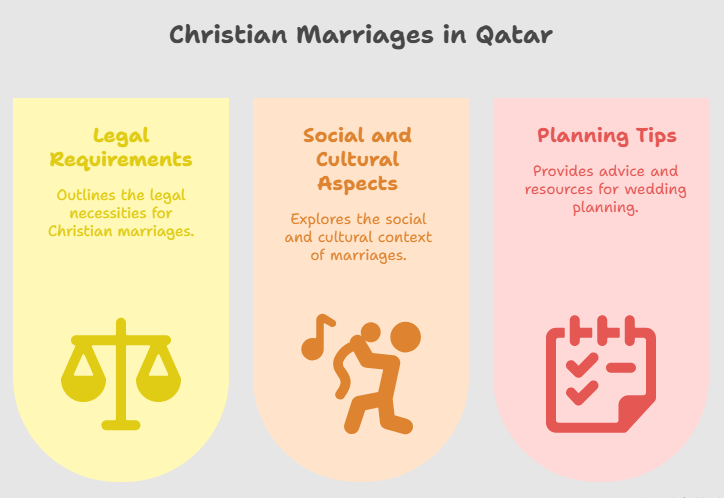
Qatar is a Muslim country that follows the Sharia law, which governs the personal and family matters of Muslims. However, Qatar also respects the rights and freedoms of non-Muslims, and allows them to practice their religion and culture within certain limits. One of the areas where non-Muslims can exercise their rights is marriage. The Qatar government acknowledges Christian marriages as a form of non-Muslim marriage, and permits such marriages to be held in registered churches. The Ministry of Foreign Affairs has listed churches authorized to perform such marriages. For non-Muslims, Christian weddings can offer a means of obtaining legal recognition and protection for their marital status in Qatar. In this article, we will provide you with a guide for Christian marriages in Qatar, covering the following topics:

Legal Requirements and Procedures for Christian Marriages in Qatar
The process of obtaining a Christian marriage in Qatar is not very complicated, but it may require some trips to embassies, churches, and ministries, and some paperwork and fees. Here are the main steps and documents required for Christian marriages in Qatar:
• Obtain a no-objection letter: The first step is to obtain a no-objection letter from your respective embassies, stating that there are no legal impediments to your marriage. You will need to provide your birth certificates, divorce papers (if applicable), residents permit, passport etc. You may also need to provide a certificate of baptism or a letter from your church, confirming your religious affiliation. Each country has its own regulations, so you should check with your embassy for the specific requirements and fees.
• Get a marriage license: The next step is to obtain a marriage license from the Ministry of Justice, located on Al Rayyan Road, near Mannai Ra in the Musheirib area. You will need to fill in an application form and submit your no-objection letters, along with copies of your passport, QID, and visa. You will also need to pay a fee of QR 200. The marriage license is valid for six months and can be used to register your marriage at any authorized church in Qatar.
• Perform the marriage ceremony: The final step is to perform the marriage ceremony at an authorized church, such as the Anglican, Catholic, Coptic, or Orthodox churches of Qatar. You will need to have two witnesses present, and the ceremony must be performed by a registered clergyman. You can choose to have a traditional Christian wedding ceremony, or a simple civil ceremony, depending on your preferences and budget. After the ceremony, you will receive a marriage certificate from the church, which is recognized by the Qatar government, but must be translated into Arabic and attested by the Ministry of Foreign Affairs.
Social and Cultural Aspects of Christian Marriages in Qatar
Christian marriages are not only legal contracts, but also sacred rituals that celebrate the union of two souls and two families. Therefore, Christian marriages in Qatar involve many social and cultural aspects that reflect the diversity and richness of the Christian tradition. Here are some of the common features of Christian marriages in Qatar:
• The engagement and announcement: Before the marriage, the couple may have an engagement, where they exchange rings and vows, and seek the blessings of their parents and elders. The engagement may be done in a church, a hotel, or a private residence, depending on the availability and convenience. After the engagement, the couple announce their wedding plans to their relatives and friends, and send out invitations and announcements.
• The bride's trousseau and the spouses' house: Before the wedding, the bride's family prepares a trousseau, which consists of clothes, jewelry, cosmetics, and other items that the bride will need in her new life. The groom's family also prepares a house for the couple, which may be a rented apartment, a villa, or a hotel room, depending on their financial situation. The house is decorated with flowers, lights, and other auspicious symbols, and is stocked with food, drinks, and other essentials.
• The banquet and wedding night: On the day of the wedding, the families and guests gather at the church, where they witness the marriage ceremony, and exchange congratulations and gifts. After the ceremony, the couple and the guests move to a banquet hall, where they enjoy a lavish feast, consisting of various dishes, desserts, and beverages, that cater to the tastes and preferences of the Christian community. The banquet may also include music, dance, and entertainment, depending on the theme and style of the wedding. After the banquet, the couple leave for their house, where they spend their first night as husband and wife. The wedding night may involve some rituals, such as the cutting of the cake, the tossing of the bouquet, and the removal of the garter, depending on the regional and sub-cultural customs of the couple.
• The post-wedding ceremonies: After the wedding, the couple may perform some post-wedding ceremonies, such as the reception, the visit to the church, the return of the bride to her parents' house, and the welcoming of the bride to the groom's house. These ceremonies are meant to introduce the couple to their respective families and friends, and to seek the blessings of the God and elders.
Tips and Resources for Planning a Christian Wedding in Qatar
Planning a Christian wedding in Qatar can be a daunting and stressful task, as there are many details and elements to consider. However, with proper planning and preparation, it can also be a fun and memorable experience. Here are some tips and resources for planning a Christian wedding in Qatar:
• Start early: The earlier you start planning your wedding, the better. You will have more time to research, compare, and book the best vendors, venues, and services for your wedding. You will also have more time to obtain the necessary documents, permissions, and approvals for your marriage. Ideally, you should start planning your wedding at least six months in advance.
• Set a budget: The budget is one of the most important aspects of planning a wedding, as it determines the scale and quality of your wedding. You should set a realistic and reasonable budget, based on your income, savings, and expectations. You should also allocate your budget to different categories, such as the church, the banquet, the attire, the photography, the entertainment, and the transportation. You should also keep track of your expenses, and avoid overspending or wasting money on unnecessary items.
• Hire a wedding planner: Hiring a wedding planner can be a great idea, especially if you are busy, inexperienced, or overwhelmed by the wedding planning process. A wedding planner can help you with every aspect of your wedding, from finding the best vendors, to negotiating the contracts, to coordinating the logistics, to managing the emergencies. A wedding planner can also help you with the legal and cultural aspects of your wedding, such as obtaining the marriage license, arranging the no-objection letters, and organizing the ceremonies. You can find many professional and experienced wedding planners in Qatar, who specialize in Christian weddings.
• Be creative and flexible: Planning a Christian wedding in Qatar can be a challenge, as you may face some limitations and restrictions, such as the availability of churches, the choice of food, the dress code, and the social norms. However, you can also use this as an opportunity to be creative and flexible, and to customize your wedding according to your preferences and personality. You can choose a unique theme, a different style, or a personal touch, that reflects your identity and culture as a Christian couple. You can also be flexible and adaptable, and be ready to make some compromises and adjustments, if things do not go as planned.
Conclusion
Christian marriage in Qatar is a legal, social, and cultural phenomenon, that involves many aspects and factors. It can be a complex and difficult process, but also a rewarding and enjoyable one. By following the legal requirements and procedures, respecting the social and cultural aspects, and using the tips and resources, you can plan and execute a successful and memorable Christian wedding in Qatar. We hope this article has provided you with some useful information and guidance for your Christian marriage in Qatar. We wish you all the best for your wedding and your future. God bless you.
Disclaimer: This article provides general information and should not be construed as legal advice. Please consult with a qualified and experienced lawyer for personalized guidance regarding your specific situation.
